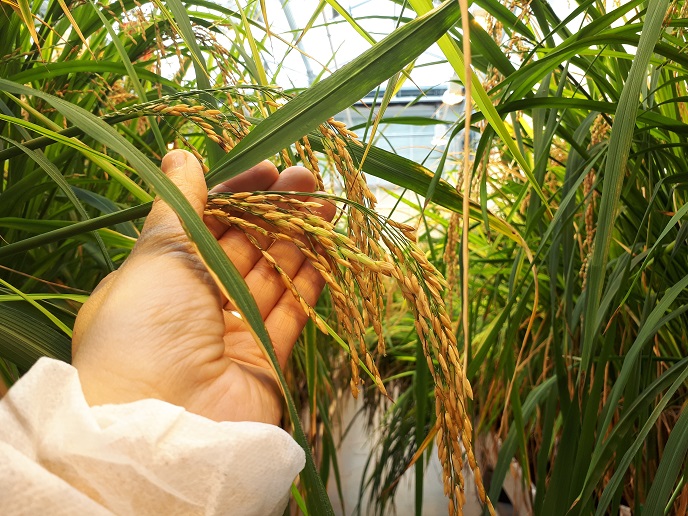Susceptibility gene tweak could lead to sustainable rice varieties
Oryza sativa, commonly known as Asian rice, has the second largest cereal production after maize. It is the most widely consumed staple food source for over half of the world’s population. Sheath blight, caused by the necrotrophic, soil-borne fungal pathogen Rhizoctonia solani(opens in new window), is a major rice disease that affects yield and grain quality. The disease is an increasing concern, especially in intensified production systems. The symptoms usually develop on the leaf sheaths as oblong, water-soaked lesions, which are greenish grey in colour. As the disease progresses, they tend to coalesce, forming larger lesions with greyish white centres surrounded by irregular borders. These lesions interrupt the water and nutrient flow to the leaf tip.
An alternative to chemical methods for sheath blight control
Large-scale deployment of semi-dwarf varieties and heavy use of nitrogen fertilisers have caused a sharp rise in the incidence of sheath blight in rice. Given that there are currently no resistant rice varieties available for cultivation, the main control method for sheath blight at this moment is the use of fungicides. Furthermore, lack of germplasm that offers resistance hampers plant breeding programmes. “We successfully identified candidate susceptibility genes in rice that could serve as targets to build up strong, durable and broad-spectrum resistance to sheath blight,” says Wladimir Tameling, coordinator of the RiZeSisT project that received funding under the Marie Skłodowska-Curie Actions programme. A susceptibility gene describes any plant gene that makes them vulnerable to infection. It does so by hosting compatible interactions with pathogens, enabling them to develop and reproduce. “The ultimate goal is to tweak susceptibility gene function to limit the pathogen’s ability to induce disease,” notes Marie Curie grantee Johanna Acevedo-Garcia.
Dissecting the molecular mechanisms of susceptibility to R. solani
Acevedo-Garcia used detached leaf bioassays to evaluate the plant response to R. solani. In particular, she inoculated rice varieties with R. solani and used a micro-chamber screening method to quantify resistance. The same method was used to perform RNA sequencing analysis of infected rice, which demonstrated pathogen-induced gene downregulation and upregulation (135 and 1 091 genes, respectively). These results were used to identify a number of candidate susceptibility genes in rice. Acevedo-Garcia encountered some problems with certain R. solani isolates obtained from public germplasm collections which impacted her analysis. After sequencing genomes, she discovered that they were not R. solani but a different microorganism. “Another challenging issue has been to effectively adapt bioassays and yield highly reproducible results. Research in this field is still scant,” explains Acevedo-Garcia. “We heavily invested our efforts in this direction and are very proud of having developed robust bioassays in plants and detached leaves to evaluate the response of our plant material to the pathogen.” Tameling concludes: “Probing susceptibility gene function in rice is opening up new avenues for developing broad-spectrum crop resistance to sheath blight. Our research is poised to make a big impact on plant breeding programmes, helping produce improved rice varieties that resist damage by R. solani without the side effects of chemical methods.”







